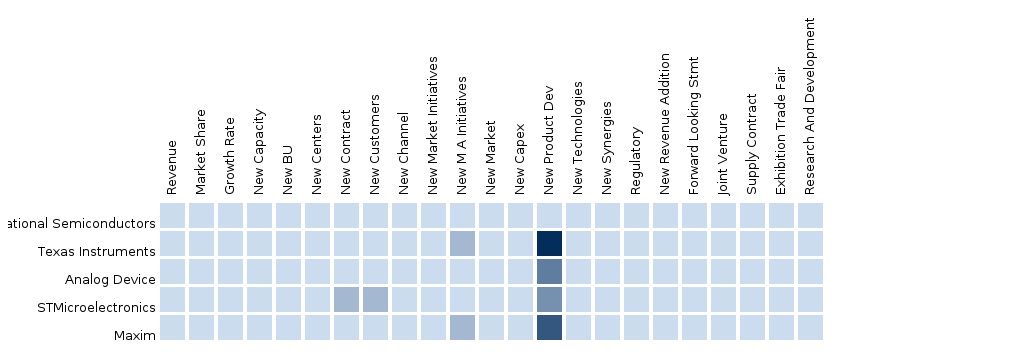Temperature sensors are expected to witness tremendous growth in the next five years as they are widely used across different application segments. Currently, the market is dominated by contact type sensors such as thermocouples and RTDs; however, a strong competition between contact and noncontact temperature sensing technologies is expected in the coming years. Non-contact temperature sensors are dominated by IR temperature sensors and increasingly used in high-temperature applications. IR sensing is highly recommended in the food & beverage industry, plastic industry, and metal industry, among others.
Due to improved sensitivity, temperature sensors are used in various applications, such as petrochemicals, automotive segments, consumer electronics, computer peripherals, space applications, and industrial segment. There is a significant rise in demand for consumer electronic devices that use microprocessors, such as smartphones, media players, cameras, and gaming devices. The acceptance of non-contact temperature sensors in many application segments is expected to add on to their consumption in the coming years. Safety-related mandates in Europe are acting as a major driver to the growth of the European temperature sensor market. Technological advancements are leading to new opportunities in the temperature sensor market in Europe, mainly with regard to the petrochemicals industry.
The value of the Europe temperature sensor market in 2013 was $788 million and is expected to reach $1.01 billion by 2018, at a CAGR of 5% from 2013 to 2018. In terms of volume, 535 million temperature sensors were shipped in 2013 and the number is expected to reach 888 million by 2018.
The temperature sensor market in Europe is triggered due to a lot of factors, such as vehicle production in emerging markets, increasing government intervention, availability of strong aftermarket, and continuous demand from consumer electronics and computing peripherals. The competition within the technologies, pricing, and maturity of critical end-user segments are the major restraints to the market growth. Technological advancements and emergence of the MEMS technology in temperature sensing are the future opportunities for temperature sensors in Europe.
Scope of the Report
This temperature sensor market research report categorizes the European market on the basis of different types of applications and countries, with revenue forecasts and analysis of the various trends in these segments.
On the Basis of Product Type
In this section, the temperature sensor market is divided as per the type of sensor used. Temperature sensor ICs, Thermistor, Resistive Temperature Detectors (RTD), and Thermocouple are the prominent sensor types used for various applications.
On the Basis of Applications
In this section, the temperature sensor market is divided as per the applications for which the sensors are used, namely automotive and aerospace, petrochemicals, consumer electronics, utilities, and industrial segment.
On the Basis of Region
The European market is segmented into the U.K., Germany, and Italy, among others.
Each section will provide market data, market drivers, trends, and opportunities, key players, and competitive outlook. This report will also provide market tables for covering the sub-segments and micro-markets. In addition, the report also provides company profiles covering all the sub-segments.
Customization Options:
Along with the market data, customize the MMM assessments to meet your company’s specific needs. Customize to get comprehensive industry standards and deep dive analysis of the following parameters:
Product Analysis
- In-depth trend analysis of products in competitive scenario
- Product matrix, which gives a detailed comparison of product portfolio of each company, mapped at country level
- Product matrix, which gives a detailed comparison of product portfolio for temperature sensor market, along with the various applications they are used for
- Comprehensive coverage of regulations followed in each country (U.S., Canada, and Mexico)
Data from Manufacturing Firms
- Fast turn-around analysis of manufacturing firms with response to market events and trends
- Various firms’ opinions about different products
- Qualitative inputs on macro-economic indicators and mergers & acquisitions in each country
- In-depth analysis of the market for different applications in temperature sensor market
Shipment/Volume Data
- Tracking of the value of components shipped annually in each country
- Tracking quantitative inputs of the temperature sensor applications in each country
Trend Analysis of Applications
- Application matrix, which gives a detailed comparison of application portfolio of each company, mapped at country level
- Application matrix, which gives a detailed comparison of application portfolio for the temperature sensor market

Please fill in the form below to receive a free copy of the Summary of this Report
Please visit https://www.micromarketmonitor.com/custom-research-services.html to specify your custom Research Requirement













